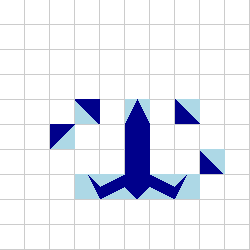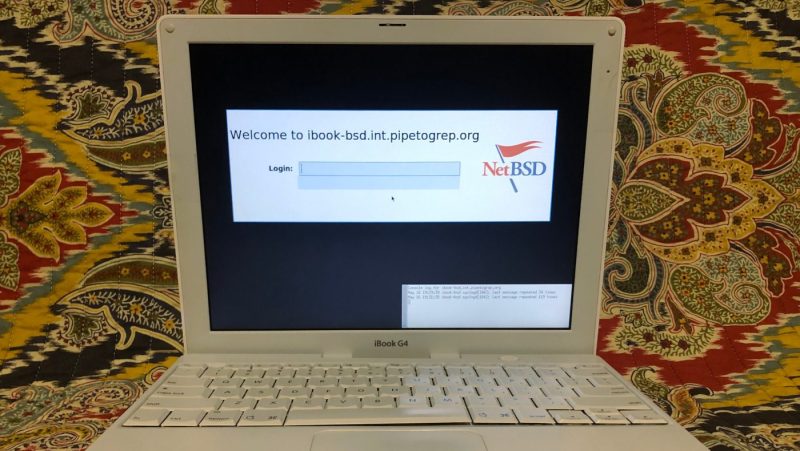What can you do with a laptop enough to drink even in the Puritan ex-colonies? 21 years is a long time for computer hardware– but [Chris] is using his early-2004 iBook G4 for game dev thanks to NetBSD.
Some of you might consider game dev a strong word; obviously he’s not working on AAA titles on the machine he affectionately calls “Brick”. NetBSD includes pygame in its repositories, though, and that’s enough for a 2D puzzle game he’s working on called Slantics. It’s on GitHub, if you’re curious.

Why NetBSD? Well, [Chris] wants to use his vintage hardware so that, in his words “collecting does not become hoarding” and as the slogan goes: “Of course it runs NetBSD!” It’s hard to remember sometimes that it’s been two decades since the last PPC Macintosh. After that long, PPC support in Linux is fading, as you might expect.
[Chris] tried the community-supported PPC32 port of Debian Sid, but the installer didn’t work reliably, and driver issues made running it “Death by a thousand cuts”. NetBSD, with it’s institutional obsession with running on anything and everything, works perfectly on this legally-adult hardware. Even better, [Chris] reports NetBSD running considerably faster, getting 60 FPS in pygame vs 25 FPS under Linux.
This is almost certainly not the year of the BSD Desktop, but if you’ve got an old PPC machine you feel like dusting off to enjoy a low-powered modern workflow, NetBSD may be your AI-code-free jam. It’s great to see old hardware still doing real work. If you’d rather relive the glory days, you can plug that PPC into a wayback proxy to browse like it’s 2005 again. If you get bored of nostalgia, there’s always MorphOS, which still targets PPC.
















I mean, yeah. Linux’s “it runs on everything” title is pretty undeserved. It doesn’t even run on early pentiums anymore.
There’s a reason I’ve been looking at NetBSD for long-lived arm board support. Just have a look through their available DTS files and go to town. That shit will be supported until the heat death of the universe.
And there’s also OpenBSD/macppc and MacOS 9.2.2 can be made to run. So NetBSD and MorphOS are not the only option.
a laptop old enough
From the linked page “Just because a computer is old does not mean that it’s trash. It also does not mean that it can’t run more modern software even if in a more limited fashion.”
Sure. I used to think that keeping all that old hardware out of the landfill was a worthy cause. But… new stuff uses so much less electricity. I’m no longer sure we wouldn’t be better off recycling all but a few saved for museum pieces.
i still have warm feelings for my 2004 ibook g4 but its hdd was reporting bad blocks when i retired it 15 years ago, and its battery is dead of course, and it was due for a third keyboard replacement, and its second wall wart was also dying. when i retired it, i looked back on the maintenance cost so far and i decided that for my daily driver it is definitely worthwhile to do maintenance. but for an obsolete piece? it’s not so much re-using something old as buying a bunch of new stuff to handicap by hooking it up to something old.
i’d struggle to find a use for it. like if i tethered it as a terminal, it has no advantages over any of my more recent ex-laptops. as a passive display, it has no advantages over the extremely low cost of a monitor or android tablet. since i run the browser remotely these days, it actually has plenty of cpu/ram to be my daily driver, but in order to reprise that role i’d have to spend a bunch on maintenance and then its battery life and weight and heat management would still be awful (it was pretty good for 2004).
basically, if i install linux or netbsd on it, then it becomes virtually indistinguishable from all of my modern hardware, except that it’s got less of every feature and more of every wear-defect. so if i did bring it back, it would be to run os x 10.3, duh. i wonder if its optical driver still works so i could restore os x from CD if i put a new SSD in it.
i don’t mean to be such a downer but i try to do this sort of project every now and then, and it’s always a downer. i really don’t use much cpu/ram so i think these 20 year old “supercomputers” are still potent…and in practice i find it easy enough to deal with all of legacy problems of like installing a 20 year old version of debian or rebuilding my programs for x86-32. but the incidentals always get me. like i recently invested a bunch of effort to reuse a 2004 computer, only to find that it hard reboots a couple times a week (bad ram?).
same problem with reusing phones. between my wife and i, i have a pretty impressive set of discard phones but if i actually go to use them for anything at all, they all have one problem after another. even with my pile of old phones, if i wanted one to dedicate to some task with a custom android app, i would probably go to the grocery store (or temu) and buy a new cheapo phone instead.
snort
A longtime friend congratulated me for convincing my sister to let me borrow her laptop.
Nifty little unit. Unfortunately, most of these didn’t survive the ROHS GPU solder. But, yeah, NetBSD ran pretty smartly on it in probably about 2009.